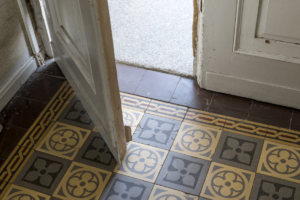Canadian artist, Timothy Schmalz, created a bronze statue named the “Homeless Jesus.” It’s a life-size sculpture of what appears to be a man without a home, wrapped in a blanket and lying on a park bench. The exposed feet carrying nail holes are the only indicators that the man is Jesus.
Originally installed at Regis College in Toronto, many more have been erected across the world as the provocative piece grew in popularity. You may remember hearing about the sculpture in the news or even on Saturday Night Live after a local resident mistook the art for an actual homeless man and reported it to the police.
Jesus Struggled with Home
 The sculpture unmistakably depicts Jesus’ solidarity with people experiencing poverty and homelessness as one who had “nowhere to lay his head” (Matt. 8:20). For those of us who struggle with the notion of home or securing shelter, it’s a reminder that Jesus, too, had a fraught relationship with home. Every Advent, within our own domiciles, we set up the nativity scene. This simple decoration serves as a symbol of the Holy Family struggling to find a roof for their head. Jesus would go on to be a prophet disrespected in his hometown, and he relied on others to share their homes. Most importantly, he frequently left those abodes to go about his work of creating a new type of home where God and humanity dwell in peace. Jesus is a friend to those who experience all kinds of homelessness.
The sculpture unmistakably depicts Jesus’ solidarity with people experiencing poverty and homelessness as one who had “nowhere to lay his head” (Matt. 8:20). For those of us who struggle with the notion of home or securing shelter, it’s a reminder that Jesus, too, had a fraught relationship with home. Every Advent, within our own domiciles, we set up the nativity scene. This simple decoration serves as a symbol of the Holy Family struggling to find a roof for their head. Jesus would go on to be a prophet disrespected in his hometown, and he relied on others to share their homes. Most importantly, he frequently left those abodes to go about his work of creating a new type of home where God and humanity dwell in peace. Jesus is a friend to those who experience all kinds of homelessness.
COVID-19 Made Home Even Less Attainable for Some
I’ve been thinking a lot about homes recently. The COVID-19 pandemic exacerbated conditions that lead to homelessness. More and more people faced eviction from their homes amid unemployment. Increasingly we are seeing insecure access to healthcare and the devastating loss of family and friends. On top of that, who can ignore the current housing market, with home prices rising to exorbitant levels, leaving more without the possibility of homeownership? It is undeniable that:
- Jesus stands in solidarity with those experiencing homelessness.
- Increasingly people lack access to affordable housing.
- We neglect basic human dignity when we withhold a home or shelter or make it impossible to obtain.
I don’t deny these facts, nor should this reflection take away from any of these truths. I’m convinced they must remain at the forefront of our thinking as we grapple with the issue of homelessness. I simply want to add a new dimension to the conversation: the sacramentality of a home.
How a Home Can be Sacramental
The people of The Episcopal Church are sacramental people. “Sacramental” is just a fancy word to say we believe God communes with us through the created order—physical stuff. Ordinary materials like bread, wine, and water become our quintessential doorways to God. They allow us to experience the divine through our senses of smell, taste, sight, sound, and touch. We privilege certain materials as “sacraments,” but we also believe all creation is teeming with the promised potential of becoming the next doorway through which God speaks to us.
This means that a house has the potential to serve us sacramentally. Ideally, a house becomes a place to encounter God. We practice the Christian virtues of offering hospitality, keeping the sabbath, promoting peace, and experiencing joy within the home. Home is a space we exhibit our creativity and stewardship. It is a place that should nurture us and provide security and comfort. Our home is a refuge where we learn to bandage our wounds and the wounds of those who cross our threshold. Home feels intimate and sacred.
This is the spiritual blessing of a house. It can become the tangible sign we inhabit that allows us to make sense of our true home in God. The God who comforts and protects us; who is hospitable and oriented to peace; who is a refuge and creative Spirit.
Homelessness Takes on a New Significance
Admittedly, “home” can be a fraught subject for some, a place of wounds and negative memories. It may represent the ways we’ve never felt at home anywhere. We must hold space for these complex emotions as this is the reality for many people. Our world is a broken place, and home is not exempt from that. This becomes undeniable for those experiencing homelessness.
Homelessness bars us from the physical and spiritual thresholds required to invite God and neighbor into our lives.
We would never deny someone baptism. A growing number hold the conviction that the Eucharist, too, should be shared freely with anyone with outstretched hands. As a clergyperson, I know the Eucharist and secure housing are not sacramentally commensurable. However, a house can allow us to experience powerful truths about God and ourselves, not unlike the church’s Sacraments we’ve learned to share generously.
If homes can be sacramental, then we must raise some important questions. What kind of sacramentality do we permit to be withheld from our neighbors? If secure housing is a doorway to God, then—whether by things done or left undone—why have we grown accustomed to closing that door in the face of people experiencing homelessness?

